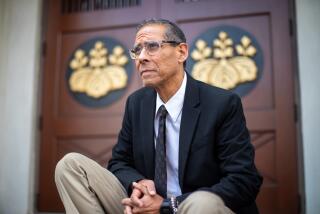Condemned Killer Loses Plea to Avoid Death Penalty
- Share via
SAN DIEGO — Condemned killer Robert Alton Harris lost his latest appeal Wednesday, when a federal judge rejected arguments that his rights were violated in 1979 by a jailhouse informant’s testimony at his double-murder trial.
Harris’ attorneys argued that the informant, Joey Dee Abshire, had been recruited by prosecutors to obtain information from Harris about the killings of two 16-year-old boys in San Diego and then to testify about that information at Harris’ trial. The attorneys had asked for a new trial on grounds of prosecutorial misconduct.
Harris, 38, was convicted of murdering the boys on July 5, 1978, after stealing their car for use in a bank robbery.
Defense attorney Charles Sevilla argued that Abshire was acting as a police agent instead of a casual observer when he pumped Harris for information while the men shared a cell on July 26, 1978.
Abshire, 44, a career criminal now serving a 16-year sentence in a Nevada prison, testified that Harris told him he killed the teen-agers to eliminate them as witnesses. Sevilla argued that Abshire’s testimony was crucial to the prosecution’s case because it helped them show that the killings were deliberate--the key element in a capital case.
Abshire testified last week at a special hearing before U.S. District Judge William Enright that he lied 12 years ago when he testified at Harris’ trial. He said two district attorney’s investigators asked him to return to a holding cell he shared with Harris and question him about the murders.
Enright ruled that Abshire recanted his story only because of an inmate code that looks unfavorably on prisoners who testify as informants.
The judge said he was strongly influenced by a 15-minute tape recording of Abshire’s meeting with investigators on July 26, 1978. On the tape, Abshire could be heard talking freely with investigators about the Harris conversation; no deal was discussed.
Enright’s findings will be reviewed by a three-judge panel from the U.S. 9th Circuit Court of Appeals. If his findings are sustained, Harris’ attorneys could seek another hearing before the panel, which could be asked to send the issue to the entire 9th Circuit.
If the appeals court upholds Enright’s ruling, Harris’ attorneys can appeal to the U.S. Supreme Court.
The Circuit Court is also considering another appeal from Harris’ attorneys, who questioned the competency of the psychiatric assistance for their client. The attorneys said new evidence shows that Harris is mentally ill and suffers from brain damage, and psychiatrists should have discovered this earlier.
More to Read
Sign up for Essential California
The most important California stories and recommendations in your inbox every morning.
You may occasionally receive promotional content from the Los Angeles Times.










